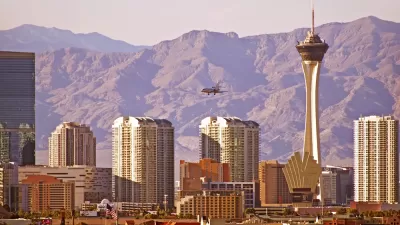As oil prices rise, so does the cost of asphalt. Concrete, historically more expensive, is now becoming a viable cost competitor. Because of its lighter shade, its also been shown to contribute less to climate change.
Concrete reflects more sun and cuts down on retained heat, reducing temperatures and the urban heat island effect. As the costs shift, it may become the pavement of choice.
"On the rhetorical battleground, one of the strongest anti-concrete arguments has always been: "So pricey!" But perhaps that is changing. In Minneapolis, when bids came in on a project that includes new bus lanes and wider sidewalks (on Marquette and Second Aves near the convention center, for those familiar with the local terrain) the concrete and asphalt options cost more or less the same, according to a local business paper.
The underlying trend here is that asphalt's price is closely tied to the price of oil. And when a barrel of crude when into three-digit land last year, asphalt was suddenly as expensive as concrete."
FULL STORY: It’s Time For Climate-Friendly Concrete Roads

Maui's Vacation Rental Debate Turns Ugly
Verbal attacks, misinformation campaigns and fistfights plague a high-stakes debate to convert thousands of vacation rentals into long-term housing.

Planetizen Federal Action Tracker
A weekly monitor of how Trump’s orders and actions are impacting planners and planning in America.

In Urban Planning, AI Prompting Could be the New Design Thinking
Creativity has long been key to great urban design. What if we see AI as our new creative partner?

San Francisco Mayor Backtracks on Homelessness Goal
Mayor Dan Lurie ran on a promise to build 1,500 additional shelter beds in the city, complete with supportive services. Now, his office says they are “shifting strategy” to focus on prevention and mental health treatment.

How Trump's HUD Budget Proposal Would Harm Homelessness Response
Experts say the change to the HUD budget would make it more difficult to identify people who are homeless and connect them with services, and to prevent homelessness.

The Vast Potential of the Right-of-Way
One writer argues that the space between two building faces is the most important element of the built environment.
Urban Design for Planners 1: Software Tools
This six-course series explores essential urban design concepts using open source software and equips planners with the tools they need to participate fully in the urban design process.
Planning for Universal Design
Learn the tools for implementing Universal Design in planning regulations.
Gallatin County Department of Planning & Community Development
Heyer Gruel & Associates PA
JM Goldson LLC
Mpact (founded as Rail~Volution)
City of Camden Redevelopment Agency
City of Astoria
Jefferson Parish Government
Camden Redevelopment Agency
City of Claremont




























